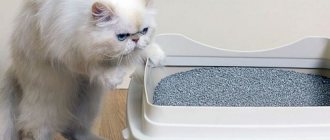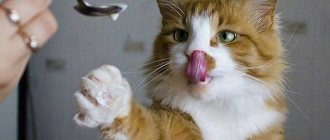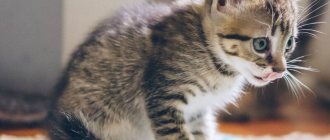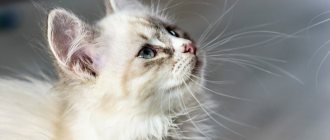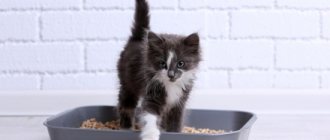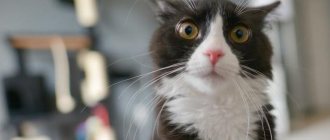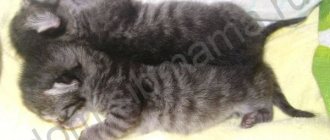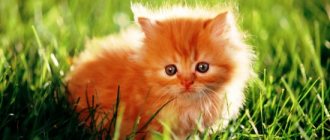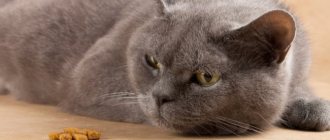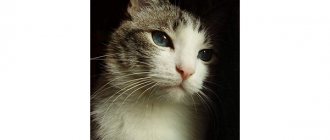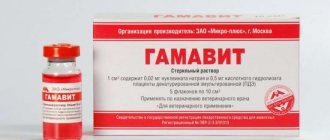If a small kitten does not eat, sleeps a lot and refuses to play, this is an alarming symptom that should prompt an immediate visit to the veterinarian. The reasons why a baby stops eating can be varied. A two-month-old kitten that has just moved into a new family is experiencing extreme stress. that is why in the first days he does not want to eat. A newborn baby may refuse to eat due to congenital diseases or too young age. In any case, it is important for the owner to find out the causes of the violation and try to eliminate them.
Why does the kitten refuse to eat?
Diseases
If a baby at the age of 2-3 months suddenly stops eating, becomes weak, lethargic, breathes heavily, and there is also an increase in temperature and nasal discharge, most likely an infection has entered the body, causing such symptoms. In such a situation, with proper treatment, appetite will normalize within two to three days. If this does not happen, the kitten weakens and gets worse; most likely, the disease is of a different nature. It will not be possible to find out the reasons for the deterioration on your own; the baby needs to be urgently taken to the veterinarian. Common diseases in which the kitten eats little or refuses food altogether:
- renal or hepatic pathologies;
- congenital cardiovascular disorders;
- gastric or intestinal dysfunction.
Stress is a common cause
At the age of 2-3 months, when the kitten happily eats complementary foods in addition to its mother’s milk, it can already be separated from the cat and given to new owners.
Finding himself in a new place without a mother, the baby will worry and meow, which does not contribute to the appearance of appetite.
In a new home, a baby left all alone experiences extreme stress. The cat refuses to eat and drink, walks around the house, meows, does not sleep, and hides from its owners. During this difficult period, it is important for a person to help the baby survive everything. It is recommended to communicate with the cat, encourage him to play together, give him something tasty, pick him up more often and show affection. Some kittens already feel more confident on the second day, their appetite, vigor, and good mood return.
Strong odor from food or dishes
When a 2-3 month old kitten begins to eat its usual food, the owner buys him a new, beautiful bowl. But you should focus not only on the appearance of the dishes, but also on what material it is made of and whether it has any foreign odors. Often new items smell like plastic in the first days of use, and the smell is so strong that the animal simply cannot stand it. Therefore, feeding a cat from such a bowl will be problematic. Some pets don't like the smell of the detergent the owner uses to wash dishes. In this case, it is better to abandon chemicals, wash the bowls in a soda solution and finally pour boiling water over them. Your pet may also not like the smell of dry or wet food, but this rarely happens. If the product is premium or super-premium, there should be no problems with foreign odors.
Too young
You can try to get rid of a very tiny fluffy using the mixture.
It’s rare, but it happens that a one-week or two-week-old kitten is left without a mother. It is very difficult to deliver a baby, because at this age, due to an insufficiently developed sucking reflex, it is difficult for him to drink milk from a bottle. A hungry cub constantly screams and quickly weakens. To prevent the baby from dying of hunger, the owner should make every effort. For feeding, it is recommended to buy a special bottle and formula for kittens. A weak baby will have to be helped to learn to suck; when he learns to do this, problems with feeding will disappear.
Parasite infestation
Kittens that were born to a mother with helminthiasis are most likely also infected. Babies do not want to eat because of the discomfort caused by worms breeding in the intestines. Soon the kitten becomes weak, its nose is constantly cold, its mucous membrane is pale. These symptoms indicate progression of anemia. With helminthiasis, the animal suffers from bloating, colic, diarrhea or, conversely, chronic constipation. External parasites can also cause a kitten to lack appetite. If traces of invasion are clearly visible on the body, it is better to contact a veterinarian who will prescribe a safe treatment regimen.
The kitten does not eat or drink, the reason is illness
If the refusal of food and water lasts more than a day and is accompanied by other alarming symptoms, the kitten is most likely sick with something. This is especially likely if the fluffy was taken from the street or bought at a “bird market”. Breeders sell purebred kittens with a veterinary passport and a set of required vaccinations. No one has vaccinated a street cat, and the chance of catching an infection among stray cats is very high. Moreover, small animals are weaker than adults and do not yet have immunity to diseases.
So, if a kitten is not eating well, the cause may be worms. Being parasitic in the body, they cause severe intoxication. The cat is losing weight, he feels nauseous and vomits, he refuses to eat, but at the same time he begins to drink more. Lethargy, heavy breathing, loose stools, and a swollen tummy are noted. In this case, you will need the help of a veterinarian. He will select a drug that will help get rid of parasites.
Refusal of food and water may indicate poisoning, a severe cold, inflammatory processes in the body, as well as dangerous viral diseases such as panleukopenia (distemper) or even rabies. In an acute infectious process, the animal’s condition suddenly deteriorates, the temperature may rise to 40-41 degrees, the kitten becomes weaker, breathes heavily, does not want or cannot get up and completely refuses food.
It must be remembered that the kitten is still very small; with serious illnesses, it quickly weakens. For example, with feline distemper, 90% of young animals die. Therefore, you need to help the baby as soon as possible; delay can cost your life.
Dangerous symptoms
The presence of discharge from the nose of a fluffy indicates the development of a serious illness.
If a small kitten does not eat anything, constantly meows and does not play because it is in a different environment, there is nothing dangerous in such a situation. As soon as the baby gets used to it, sniffs and gets to know all the family members, he will calm down, and his appetite will certainly return soon. It’s another matter when the cub feels bad for unknown reasons. If any dangerous disease develops in the body, in addition to lack of appetite, other pathological symptoms will also bother you:
- increased body temperature;
- copious discharge from the nose and eyes;
- increased salivation;
- repeated vomiting;
- diarrhea or constipation, bloating, pain when pressing on the abdomen;
- refusal of water;
- blanching of the mucous membrane;
- presence of foreign matter in feces;
- lethargy, drowsiness, while the cat does not get up all day.
How and how to help an animal
If a cat refuses food and water, then the first thing to do is take your pet to a veterinarian. It is not possible to make a diagnosis on your own at home, so you need to call a doctor at home or take your pet to the clinic.
If it is impossible to get to the veterinarian in the next 24 hours, then you need to provide the cat with rest. To do this, you should prepare a clean litter; it should not be too soft or too hard. If an animal is hiding, you should not force it out of its hiding place. You can only place a bowl of food and fresh water nearby.
Bowls of water and food should always be available to the animal.
Under no circumstances should you try to give your pet any medications without first consulting a doctor. Otherwise, you can only cause harm and provoke life-threatening consequences.
If the doctor has determined the cause, then you should follow the specialist’s recommendations and give medications according to instructions in the required dosages. This must be done calmly; you must not cause pain to the animal. Before giving medication, the cat needs to be stroked, and the tone of voice should be calm. This way, the pet will tolerate the treatment better, will not resist too much and will recover faster.
Additional recommendations:
- If the cause is stress, then the cat should be left alone for a while. It is advisable to call her to eat in a gentle tone. A calm and quiet environment, the absence of extraneous noise and periodic stroking will help you recover from stress.
- If your pet doesn't like the food, you need to replace it as soon as possible. It is recommended to give preference to balanced foods rather than cheap options containing a lot of harmful additives.
- In case of gastrointestinal upset and poisoning, you can give the animal activated charcoal (500 mg per 1 kg of weight). In this case, the tablet must be crushed and dissolved in 1 tsp. water. It is most convenient to give medicine using a syringe without a needle. It is enough to do this procedure once before seeing a doctor.
- Ticks and fleas are eliminated using special antiparasitic medications. You should not use them on your own; you should first consult your doctor. However, if this is not possible in the near future, and the animal has fleas or a tick is found, you can purchase Bars or Celandine shampoo.
- If the cause is helminthic infestations, then treatment is carried out with the help of anthelmintic drugs. The medication should be given only according to the regimen recommended by the doctor. Otherwise, larvae may remain, which will provoke a relapse.
- To alleviate the condition of an animal with gum inflammation, you can use a solution of Miramistin or potassium permanganate. It is necessary to treat the gums using a cotton pad and the selected product. This needs to be done 2 times a day. Do not press on problem areas.
A weak solution of potassium permanganate can be used to treat inflamed gums
What to do if your pet doesn’t eat, doesn’t drink and constantly sleeps
If an animal does not eat or drink, and also sleeps constantly, then this is an alarming signal of serious health problems. However, in extremely rare cases this is associated with stress. In this case, the pet should be left alone and allowed to rest. There is no danger in inactivity after stress. If the animal is lethargic, does not eat or drink for another reason, then postponing a visit to the doctor is dangerous, since with a serious pathology the cat may die.
Some recommendations that will help you hold out until the doctor arrives:
- It is necessary to ensure that fresh air enters the room.
- Do not disturb the pet. If there are other animals in the house, then for safety reasons it is better to isolate them from contact with the sick cat.
- Make sure the water in the bowl is always clean.
- If there is a special medicinal herb for cats in the house, which breeders often grow in pots, then you can pick a little and put it next to your pet. If desired, the animal can be treated with such a safe remedy.
Attention! If a cat does not drink for more than 24 hours, it can cause death. In this case, water must be injected forcibly using a thin syringe without a needle, gradually pouring it into the mouth.
How to help a kitten
If the kitten does not eat anything or drink water, then first of all you need to pay attention to the nature of the food. Small pets need special soft food. It is impossible to give a kitten food intended for adult animals, since the gastrointestinal tract of babies is still very weak. Long-term refusal of water is dangerous, so you can give your pet water using a pipette. Every hour you need to give water forcibly. The liquid should be administered in small quantities - one pipette at a time is enough.
Giving your kitten water using a pipette will prevent dehydration
In addition, the kitten should be carefully examined for rashes, sores and fleas. Particular attention should be paid to the withers and ears. If everything is clean, then most likely the problem lies in the functioning of the internal organs, which can only be determined in a clinical setting.
Attention! If a kitten has a sore in the withers area, under no circumstances should you burn it with iodine or brilliant green. This may indicate the presence of a mite or lichen. In this case, you need to undergo the necessary tests and isolate children and other animals from contact with the kitten until complete recovery.
What to do to help the kitten?
The baby will be very lucky if the adoptive mother treats him normally and does not deny him food.
If the baby is not yet a month old, and he is left without a mother, there is only one way out - buy a special bottle with a mixture for kittens and feed the pet artificially. If the kitten does not suck the rubber nipple and feeding cannot be established, you can try to find a wet-nurse cat who recently gave birth to the same cub. When introducing animals, you should give them time to sniff, because some adult cats can aggressively perceive a stranger, even if he is a newborn.
If you suspect the presence of any disease, the baby should be shown to a veterinarian. Once the diagnosis is known, the doctor will prescribe a safe and effective treatment regimen. It is important for the owner to strictly follow all the doctor’s advice and recommendations and under no circumstances self-medicate. If the reason is an unpleasant odor from food or dishes, it is recommended to change the brand of food, and also choose bowls made of high-quality plastic.
What to do if a small kitten cannot eat and drink on its own?
It happens that a little purr is separated from its mother cat too early. Experienced breeders of purebred animals give the kitten to new owners no earlier than 3 months of age, when it already knows how to eat on its own and is accustomed to a certain food. If the kitten was taken away from the cat when it was very tiny or the baby was simply found on the street, it is likely that he simply has not yet eaten anything other than his mother’s milk. The baby doesn't know how to lap from a bowl. Moreover, he has no habit of drinking water.
Such a cat will have to be fed milk from a pipette or bottle with a nipple. Moreover, it is recommended to use a special cat's milk substitute. Then you can gradually teach the kitten to lap from the bowl and eat wet food. A good way is to offer the baby food from your hand, sometimes this helps kittens start eating new food.
What to do?
If the cat asks to eat more than the norm, then you can:
- change the food to a more expensive and nutritious one. Cheap economy class mixtures do not contain the vitamins, minerals, and biologically active substances necessary for normal growth and development of the animal. Their deficiency in the cat’s body provokes overeating;
- do not feed in excess of the norm, focusing on the instructions for consuming food, the age and physiological characteristics of the cat;
- organize fractional feeding at the same time - 2-3 times a day;
- eliminate unscheduled snacks that are skillfully begged for by cunning manipulative cats.
A pregnant cat must be fed with specially formulated food that contains the full range of essential nutritional components or the diet must be further enriched with vitamins and minerals. As a preventive measure and to get rid of parasites, regularly administer anthelmintic drugs.
Diabetes mellitus and intestinal diseases require diagnosis and drug treatment. You should also contact a veterinarian if, despite all efforts, the cat constantly asks for food, and its appearance leaves much to be desired.
What is this phenomenon?
If a cat constantly asks for food, then this change in eating behavior is called polyphagia. This is a pathological condition caused by:
- gluttony and stretching of the stomach walls;
- lack of nutrients during the active growth of a young animal;
- the body's reaction to medications;
- stress or prolonged feeling of discomfort;
- cold season;
- decreased metabolism in old age.
- I want to eat.
Polyphagia can develop at any age. If your cat has been eating a lot lately, although this was unusual for him before, the reason should be identified as soon as possible.
Attention! Stressful situations and prolonged lack of appetite subsequently provoke polyphagia in cats. After a hunger strike, they try to make up for the lack of nutrients without feeling full.
